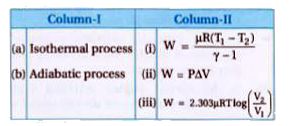Assertion: The specific heat of a gas in an adiabatic process is zero and in an isothermal process is infinite.
Reason: Specific heat of a gas is directly proportional to the heat in system and inversely proportional to change in temperature.Solution in Gujrati
Both assertion and reason are true and the reason is the correct explanation of the assertion.
Both assertion and reason are true but reason is not the correct explanation of the assertion
The assertion is true but reason is false.
Assertion and reason both are false.
The correct Answer is:A
Step by step video, text & image solution for Assertion: The specific heat of a gas in an adiabatic process is zero and in an isothermal process is infinite. Reason: Specific heat of a gas is directly proportional to the heat in system and inversely proportional to change in temperature. by Physics experts to help you in doubts & scoring excellent marks in Class 11 exams.
Updated on:21/07/2023Topper's Solved these Questions
- THERMODYANMICS BOOK - KUMAR PRAKASHANCHAPTER - THERMODYANMICS EXERCISE - Section-D Ncert Exemplar Solution (MCQs)
6 Videos
- THERMODYANMICS BOOK - KUMAR PRAKASHANCHAPTER - THERMODYANMICS EXERCISE - Section-D Ncert Exemplar Solution (MCQs More than one option )
5 Videos
- THERMODYANMICS BOOK - KUMAR PRAKASHANCHAPTER - THERMODYANMICS EXERCISE - Section-C (Objective Questions (Match))
4 Videos
- THERMAL PROPERTIES OF MATTERBOOK - KUMAR PRAKASHANCHAPTER - THERMAL PROPERTIES OF MATTEREXERCISE - Question Paper (Section - D) (Answer following in brief :) Each carry 4 marks
1 Videos
- UNITS AND MEASUREMENTBOOK - KUMAR PRAKASHANCHAPTER - UNITS AND MEASUREMENTEXERCISE - Section -F (Questions from Module )
20 Videos
Similar Questions
An ideal gas undergoes four different processes from the same initial state as shown in figure of P-V diagram. Four processes are adiabatic, isothermal, isobaric and isochoric. Out of 1,2,3 and 4 which one is adiabatic ?

View SolutionWhich of the processes described below are irreversible ?
View SolutionIn Column-I processes and in Column-II formulas of work are given. Match them appropriately :

View SolutionIn an experiment on the specific heat of a metal, a 0.20 kg block of the metal at 150∘C is dropped in a copper calorimeter (of water equivalent 0.025 kg) containing 150 cm3 of water at 27∘C. The final temperature is 40∘C. Compute the specific heat of the metal. If heat losses to the surroundings are not negligible, is your answer greater or smaller than the actual value for specific heat of the metal ?
View SolutionIf the error in measurement of radius of a shpere is 2% then the error in determination of volume of the sphere will be …………
View SolutionStatement I: The specific heat of a gas in an adiabatic process is zwero but it is infinite in an isothermal process. Statement II: Specific heat of a gas is directly proportional to heat exchanged with the system and inversely proportional to change in termperature.
View SolutionWhat is specific heat of a gas is an adiabatic process?
View SolutionThe specific heat of a gas in an isothermal process is
View SolutionWhat is the specific heat of a gas in an adiabatic process ?
View SolutionWhat are the values of specific heat of a gas in isothermal and adiabatic processes?
View SolutionA : The specific heat of an ideal gas is zero in an adiabatic process. R : Specific heat of a gas is process independent.
View SolutionStatement I : The specific heat of a gas in an adiabatic process is zero but it is infinite in an isothermal process. Statement II : Molar specific heat of a gas is directly proportional to heat exchanged with the system and inversely proportional to change in temperature.
View Solutionसमतापीय प्रक्रम में गैस की विशिष्ट ऊष्मा होती है
View Solutionप्रक्कथन :रुद्धोम प्रक्रिया में किसी गैस की विशिष्ट ऊष्मा शून्य एवं समतापीय प्रक्रिया में अनन्त होती है।
कारण :किसी गैस की विशिष्ट ऊष्मा निकाय के ऊष्मा परिवर्तन के अनुक्रमानुपाती एवं ताप परिवर्तन के व्युत्क्रमानुपाती होती है।
View SolutionWhat is the specific heat of a gas in an a adiabatic process ?
View Solution
